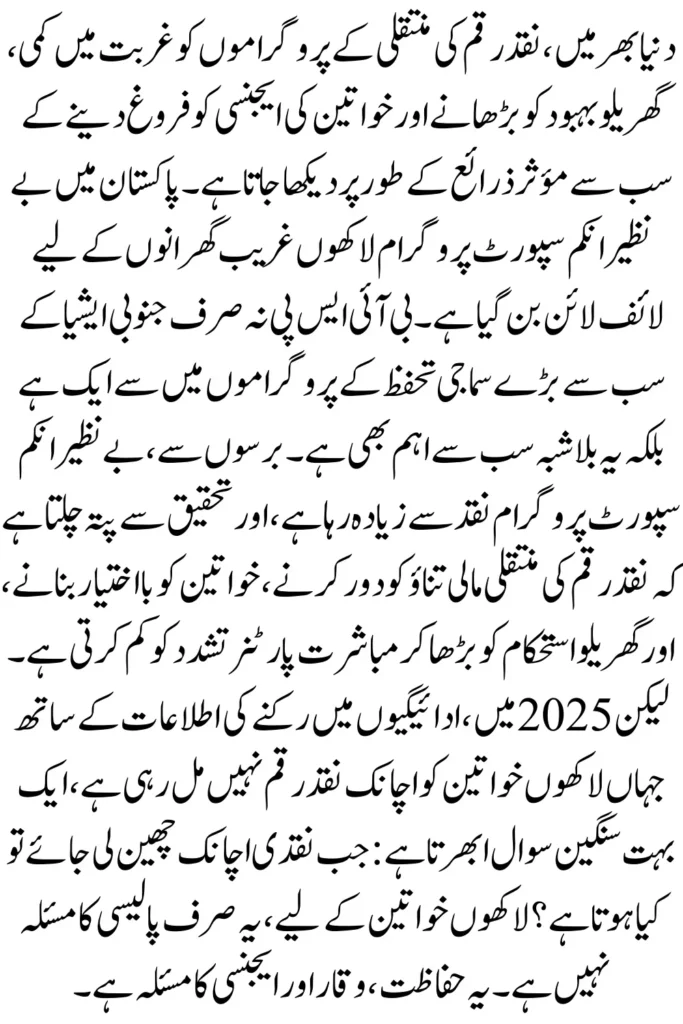BISP Cash Transfers & IPV 2025
BISP Cash Transfers & IPV 2025. Around the world, cash transfer programmes are viewed as among the most effective means of reducing poverty, enhancing household welfare, and promoting women’s agency. In Pakistan, the Benazir Income Support Programme (BISP) has become a lifeline for millions of impoverished households. BISP is not only one of the largest social protection programmes in South Asia, but it is indisputably one of the most significant as well. For years, BISP has been more than cash, and research indicates that cash transfers reduce intimate partner violence (IPV) by relieving financial strain, increasing women’s empowerment, and increasing household stability. But in 2025, with reports of a halt in payments where millions of women suddenly are not receiving cash, a very serious question emerges: what happens when cash is suddenly taken away? For millions of women, this is not just an issue of policy; it is an issue of safety, dignity, and agency.
Why BISP Matters Beyond Financial Relief
Cash transfers are not just about putting money in people’s hands. They reshape family roles, change household decision-making, and improve emotional well-being.
Key protective effects of BISP payments:
- Less financial strain: Often, disputes regarding food, education, and medical expenses contribute to poverty–BISP can help mitigate disputes.
- Empowering women: Direct cash transfer policies give women financial agency, hence lowering their risk of violence.
- Enhancing relationships: Families are less likely to fight about money. So when families report having fewer financial concerns, they report better communication.
- Social recognition: When women provide financially, they are afforded greater recognition within their families and communities.
BISP has become one of the most effective barriers protecting women from IPV in Pakistan.

The Role of BISP in Pakistan
The Benazir Income Support Programme, started in 2008, is now considered a backbone of social protection in Pakistan.
What makes BISP unique?
- Payments are exclusively directed to women, making them central decision-makers.
- It covers millions of families in both urban and rural areas.
- Transfers are unconditional, allowing women freedom to spend as they need.
Beyond Poverty Reduction
BISP impacts go far beyond money:
- Education: Many families pay for school fees.
- Healthcare: Payments help with nutrition and medical costs.
- Household stability: Reduced financial stress means fewer arguments and more peace at home.
This makes BISP one of the few programs directly linked to lower IPV rates in Pakistan.
CM Punjab T-Cash Card 2025 – Eligible to Apply & Online Registration Process
What Happens When BISP Payments Suddenly Stop?
When BISP payments stop without warning in 2025, millions may face renewed poverty and instability.
Return to Pre-Program Stress
- Families lose a stable income.
- Food insecurity and unpaid bills rise.
- Financial stress leads to renewed household conflicts, often triggering IPV.
Loss of Women’s Empowerment
- Women lose control over finances.
- Decision-making shifts back to men or in-laws.
- Women’s vulnerability to violence increases.
Strain on Household Relationships
- Couples argue more over scarce resources
- Tensions rise, creating a fragile family environment.
- Emotional stress increases the chances of domestic violence.
Uneven Outcomes Across Families
- Some women who saved money or gained confidence may still benefit.
- But most poor households slide back into insecurity very quickly.
Why Stopping BISP Increases IPV
Research shows several mechanisms that explain the risks:
- Economic stress reignites conflicts.
- Shifted power dynamics reduce women’s authority.
- Psychological strain increases anxiety and helplessness.
- Loss of recognition diminishes women’s role as financial contributors.
Together, these factors create a heightened risk of IPV when payments are stopped.
Lessons from International Experience
Global studies prove that well-designed cash transfers can reduce violence and improve family well-being.
- Bangladesh: Cash + nutrition programs reduced IPV, with benefits lasting years.
- Latin America: Education-linked transfers reduced conflicts and increased school attendance.
- Sub-Saharan Africa: Direct transfers to women were more effective in reducing IPV than household-based ones.
- Global lesson: Cash transfers work best when combined with empowerment initiatives, savings, and social services.
How to Reduce Harm if Programs End
If governments or donors must end programs like BISP, abrupt withdrawal is dangerous. Safer approaches include:
- Gradual exit: Reduce payments step by step.
- Encourage savings: Build savings habits while the program runs.
- Skills training: Help women gain sustainable income sources.
- Complementary services: Provide counselling, financial literacy, and health support.
- Transparent communication: Inform families in advance to reduce stress.
These measures can protect the progress made under BISP.
Policy Implications for Pakistan
For Pakistan, this moment is critical. Sudden withdrawal of BISP risks undoing years of progress.
- Protect women: Keep women as central recipients of BISP.
- Ensure sustainability: Integrate empowerment and savings into future models.
- Mitigate risks: Use transitional measures if payments must pause.
- Monitor impacts: Track not just poverty but also IPV and family stability.
Only then can BISP 2025 and beyond safeguard both poverty relief and women’s empowerment.
Conclusion
BISP Cash Transfers & IPV 2025. The potential end of BISP cash transfers in 2025 could have lasting impacts; though active payments reduce poverty and protect women from IPV, if payments are suddenly cut off, then there is a risk of returning to instability, conflict, and violence.
CM Punjab Green Tractor Scheme: 20,000 More Tractors Approved – Full Details
